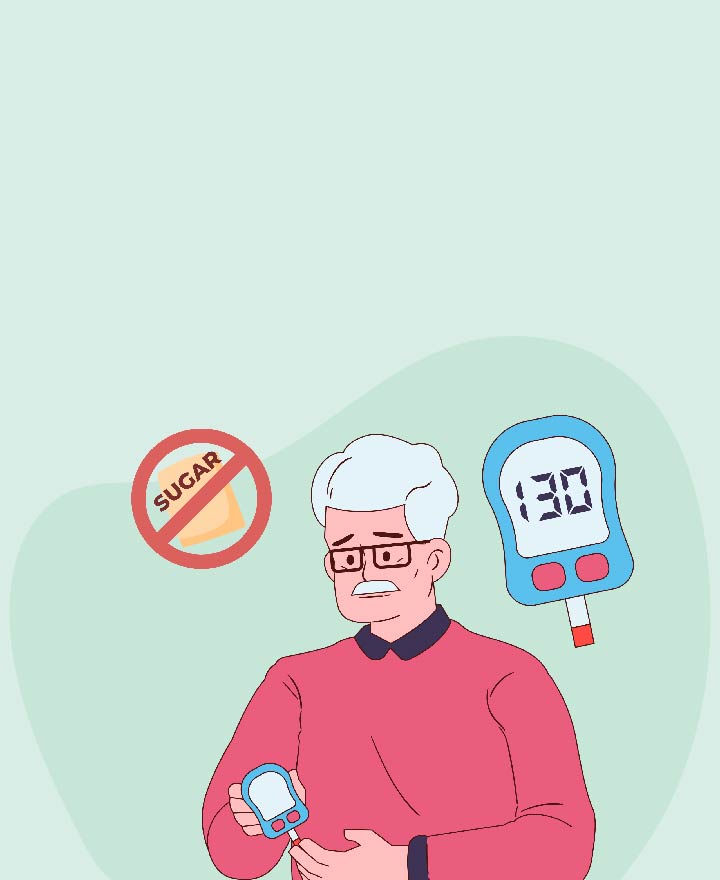

Does Sugar Cause Diabetes? Myth vs. Fact
“Does sugar cause diabetes?” is a common question which people ask as diabetes is a disease characterized by high blood sugar levels. Take a look at this article to know about sugar’s role in developing diabetes.
What is Diabetes?
Diabetes is a chronic condition which occurs when your body is no longer able to effectively regulate blood sugar levels. This can happen either when your pancreas stops producing enough insulin or when your cells become resistant to insulin that is produced or both.
There are 2 main types of diabetes –
- Type 1 diabetes : Occurs when your immune system attacks your pancreas, destroying its ability to produce insulin.
- Type 2 diabetes : Occurs when your pancreas stops producing enough insulin, when your body’s cells no longer respond to the insulin it produces or both.
Myths vs. Facts Associated with Diabetes
Some of the common myths associated with diabetes include:
Myth 1: Sugar causes diabetes
Fact: No. Sugar doesn’t cause diabetes but it does contribute as a risk factor. Eating large amounts of sugar can indirectly raise diabetes risk by contributing to weight gain and increased body fat — which are separate risk factors for developing diabetes. Gaining too much weight contribute to developing type 2 diabetes in some people.
Myth 2: People with diabetes can eat more fruits
Fact: Fruits have sugar. When eaten in excess, they can increase the glycemic index. Hence, moderation is the key. Additionally, some foods such as pears, apples, and oranges are better choices than papayas, bananas, and custard apples.
Myth 3: Diabetes is caused by overeating
Fact: This is partially true. Diabetes is a combination of genetic predisposition, poor eating habits, and physical inactivity. Lack of insulin can cause type I diabetes, whereas overeating leads to obesity and can be a causative factor for type II diabetes.
Myth 4: People with diabetes cannot take bread, pasta, and rice
Fact: It is better to avoid refined grains but limiting portion size can do wonders. You can indulge in these foods in moderation.
Myth 5: People with diabetes should avoid intake of natural sugars
Fact: Natural sugars exist in fruits and vegetables and have not been added during manufacturing or processing. Since these types of sugar exist in a matrix of fiber, water, antioxidants and other nutrients, they’re digested and absorbed more slowly and are less likely to cause blood sugar spikes. It is also easier to keep you natural sugar consumption in check as fruits & vegetables tend to contain far less sugar by weight than many processed foods.
Myth 6: Diabetes is contagious
Fact: Diabetes is a non-communicable disease and cannot be passed on by sneezing, through contact or via blood. It can genetically be passed on from parents to their children.
Myth 7: People with diabetes can’t do much work
Fact: Having diabetes will not break you from having a job or affect the amount of work you can do.
Can the Risk of Diabetes be Reduced?
The risk developing diabetes can be prevented by following these methods:
• Lead a healthy lifestyle by reducing weight.
• Follow a balanced diet with proper nutrition.
• Avoid junk foods or fatty foods.
• Exercise regularly for 30 to 40 minutes.
• Limit alcohol intake and refrain from tobacco.
• Increase the intake of essential minerals such as magnesium.
• Monitor blood sugar level regularly.
• Be careful about your annual eye checkups.
Conclusion
Consumption of added sugar in large quantities may increase the risk factor of diabetes. The probability of this developing diabetes can be reduced by making some dietary & lifestyle changes.
One of the important components of our overall wellness is also being financially secured. Healthcare emergencies can happen any time, but a good health insurance can protect you from such uncertain situations. To know more about it, click here
Source: Healthline, Mayoclinic
Disclaimer: This blog provides general information and discussions about health and related subjects. The information and other content provided in this blog, website or in any linked materials are not intended and should not be considered, or used as a substitute for, medical advice, diagnosis or treatment. Kindly contact your Doctor before starting a new medicine or health regime.
Related Articles
7 effective yoga asanas that will help with diabetes
Diabesity : How obesity is related to diabetes
The Diet Chart for Diabetic Patients
Vegetarian diet - how to get nutrients
20 foods you should be eating everyday for a longer life
Published on March 29, 2023

















 Health Insurance
Health Insurance  Travel Insurance
Travel Insurance  Car Insurance
Car Insurance  Cyber Insurance
Cyber Insurance  Critical Illness Insurance
Critical Illness Insurance
 Pet Insurance
Pet Insurance
 Bike/Two Wheeler Insurance
Bike/Two Wheeler Insurance  Home Insurance
Home Insurance  Third Party Vehicle Ins.
Third Party Vehicle Ins.  Tractor Insurance
Tractor Insurance  Goods Carrying Vehicle Ins.
Goods Carrying Vehicle Ins.  Passenger Carrying Vehicle Ins.
Passenger Carrying Vehicle Ins.  Compulsory Personal Accident Insurance
Compulsory Personal Accident Insurance  Travel Insurance
Travel Insurance  Rural
Rural